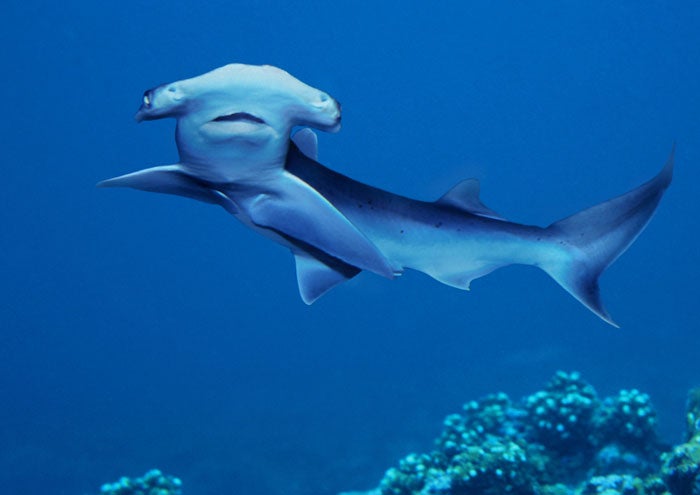Shark-fin soup trade threatens hammerheads

Your support helps us to tell the story
From reproductive rights to climate change to Big Tech, The Independent is on the ground when the story is developing. Whether it's investigating the financials of Elon Musk's pro-Trump PAC or producing our latest documentary, 'The A Word', which shines a light on the American women fighting for reproductive rights, we know how important it is to parse out the facts from the messaging.
At such a critical moment in US history, we need reporters on the ground. Your donation allows us to keep sending journalists to speak to both sides of the story.
The Independent is trusted by Americans across the entire political spectrum. And unlike many other quality news outlets, we choose not to lock Americans out of our reporting and analysis with paywalls. We believe quality journalism should be available to everyone, paid for by those who can afford it.
Your support makes all the difference.One of the most impressive members of the shark family is to be classified as endangered because of the increase in demand for shark-fin soup in the Far East.
The scalloped hammerhead was once considered immune to the effects of overfishing because it was so widely distributed, but recent surveys show it has suffered catastrophic declines – as much as 98 per cent in some regions.
Scientists will add it to the 2008 Red List of marine animals in danger of extinction, along with eight other species of shark that could soon be on the point of disappearing completely.
The other species being added to the list are the common and big-eyed thresher, the short-fin mako, the silky, the smooth hammerhead, the dusky, the tiger and the bull shark. There are currently 126 shark species classified as being at risk of extinction – either critically endangered, endangered or vulnerable.
Dr Julia Baum, a shark expert at the Scripps Institution of Oceanography in San Diego, said that many predatory sharks are in serious danger of being wiped off the face of the earth within a generation. She said: "The oceans are being emptied of sharks and if we carry on the way we are, we are looking at a really high risk of extinction for some species within the next few decades.
"Sharks are really at the top of the list of marine fish that could become extinct in our lifetime. That should be a wake-up call."
Scalloped hammerhead sharks are often caught accidently as "by-catch" with other large fish such as tuna. But in the past few years they have also become victims of the lucrative trade in shark fins, which has grown rapidly as China has become more wealthy.
The trade often involves slicing off the fins from live sharks which are thrown back into the sea, where they bleed to death.
Measures designed to curb the trade are hopelessly inadequate, according to conservationists. But what has surprised scientists is the speed at which scalloped hammerheads and other species of shark have fallen victim to the trade.
"The market is mainly in China but most of the information comes from Hong Kong because most shark fins go through there," said Dr Baum, a member of the shark specialist group of the World Conservation Union.
"It is estimated that between 26 and 73 million sharks are going through the Hong Kong fin market each year. That's three to four times the total shark catches being reported to the UN's Food and Agriculture Organisation."
Shark-fin soup was traditionally served as a wedding dish for the wealthy. But an increasing number of middle-class Chinese are now serving it to wedding guests and important business partners, Dr Baum said yesterday, at the American Association for the Advancement of Science.
"In addition, it's starting to trickle down and become more common in restaurants," she continued. "It is still served as a sign of prestige but it is also becoming a lot more common, which is another nightmare."
The rising level of demand for shark fins has led to a global growth in the trade. There are no regulations to curb it and as a result, fishing fleets around the world are taking advantage of the high-value fins of hammerhead sharks, which can sell for up to £150 a kilo.
"More and more fleets are targeting sharks directly," Dr Baum said. "The perception has been that wide-ranging species cannot become endangered because although they may be threatened in one area, they'll be found in another. But fisheries are reaching all corners of the earth and they are intense enough that these species are being threatened everywhere.
"On the high seas and international waters, there are no regulations for sharks or any catch limits – it's a free-for-all.
"That the scalloped hammerhead is endangered is a big red flag. It is one of the most highly valued shark species in the fin trade and there are no regulations for fishing it. Where it is protected, in world heritage sites like the Galapagos, shark-finning is rampant. They are protected on paper but nothing is being enforced."
Dr Baum said that scientists would like to see a meaningful "ban" on shark finning, where the fins can only be taken from entire carcasses that are brought back to port. This would mean an end to fins being stripped from live sharks.
Join our commenting forum
Join thought-provoking conversations, follow other Independent readers and see their replies
Comments